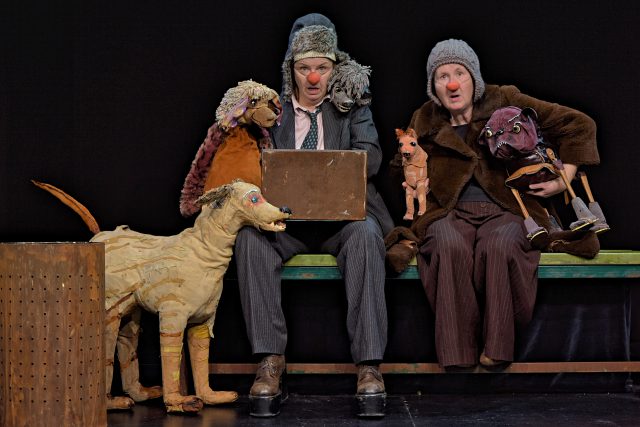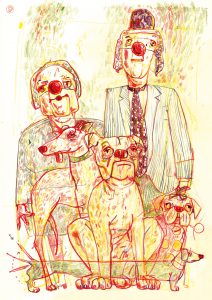For audiences ages 6 and up. With lots of music, and very few words.

- Author Annette Scheibler, Sigrun Kilger
- Direction Alberto García Sánchez, Alexandra Kaufmann
- Play Annette Scheibler, Sigrun Kilger
- Music Daniel Kartmann
- Figures & objects Ute Kilger
- Equipment & stage Luigi Consalvo
- Light Luigi Consalvo
- Assistence Manon Dumonceaux
 Two tramps sit on a bench, just enjoying life. The sun is shining; they have salami in their pockets to eat. Suddenly there is a small dog at their feet, and he stays right there with them. It’s good to have a dog, they think. He’ll keep you company, wag his tail when he sees you, and bark when a stranger comes too close to your bench. The dog is hungry, but they barely have enough salami for themselves. Perhaps the dog should look for a different home? They can think of a hundred reasons why the dog can’t stay with them. Let’s send him away… But what if he gets run over by a car, or can’t find anything to eat, or freezes to death, or is trapped by a dog-catcher? Oh, it will be OK, nothing will happen to him. But what if it does? Then suddenly there‘s not just one dog with them, but a whole bunch of them! You can look after one dog, but a whole pack of them?!
Two tramps sit on a bench, just enjoying life. The sun is shining; they have salami in their pockets to eat. Suddenly there is a small dog at their feet, and he stays right there with them. It’s good to have a dog, they think. He’ll keep you company, wag his tail when he sees you, and bark when a stranger comes too close to your bench. The dog is hungry, but they barely have enough salami for themselves. Perhaps the dog should look for a different home? They can think of a hundred reasons why the dog can’t stay with them. Let’s send him away… But what if he gets run over by a car, or can’t find anything to eat, or freezes to death, or is trapped by a dog-catcher? Oh, it will be OK, nothing will happen to him. But what if it does? Then suddenly there‘s not just one dog with them, but a whole bunch of them! You can look after one dog, but a whole pack of them?!
A clownesque, surreal play for children about sharing and the gift of compassion.
Reviews:
Kurier.at: “Saving the world on a small scale – and yet so big!” (Heinz Wagner)
IXYPSILONZETT, Yearbook for Children’s and Youth Theater 2021:
“(…) However far apart the puppet theater productions for young audiences cited so far may be in their aesthetic and content-related positions, they have one thing in common: They dismantle – sometimes deliberately, sometimes incidentally – clichéd ideals of beauty in a refreshing way.
The new production by the Ensemble Materialtheater “WUFF – wer rettet die Welt” (digital premiere June 18, 2020) goes a step further. We see two apparently homeless people waking up on a bench in the morning. And these two, who themselves have nothing but their park bench and a sausage, are visited by dogs who have nothing but hunger.
In this clownish piece about poverty, hunger, compassion, and the art of sharing, the focus, when it comes to the body, is obviously not on beauty and fashion, but on basic needs like eating, drinking, digesting, and sleeping. And yet: the two park residents take pride in themselves. This is evident not least in touching personal hygiene rituals celebrated like little dances: They pretend to wash themselves by marking a sink for each other with their arms, brush their teeth with their fingers, comb their hats… And to sleep, they don’t just lounge around on the bench. No, they adopt perfectly coordinated postures: “Cap,” in a long coat, lies down with one leg bent and one stretched out; “Tie,” in a gray suit, sits and holds a tiny checked umbrella above her.
Posture and clothing, as surface phenomena, point to something beneath or even determine it, thus not only demonstrating dignity but also creating it.
In the dog figures conceived for this play, patched, fluffy, stiff-legged figures, another aspect manifests itself, one that is also significant for the two on the park bench: They become beautiful through play. Because value is attributed to them and the life embodied in them. Beauty through appreciation.” (Anke Meyer)
“Deutsche Buehne Adrienne Braun”: The Ensemble Theater troupe has had huge success over the last 30 years with its own brand of clever, witty and innovative theatrical productions. It borrows ideas from the visual and fine arts, often incorporating music as well. Its greatest asset is the totally dry humour which garnishes the group‘s wonderfully imaginative ideas.
“Theater der Zeit Mascha Erbelding”: `One can only ever tell stories about the things one knows.‘ This thought runs like a thread (albeit with a question mark) through the Ensemble Materialtheater‘s productions, which do have a decidedly political angle. They try to shake up their audiences by means of the power of imagination, as well as using alienation through the use of puppets and other material props and effects. The Ensemble Materialtheater takes its audience – children – seriously and aims to portray and deal with vital, difficult social issues in a non-serious, artful and imaginative way.
A co-production with the FITZ! Theatre, Stuttgart & the Théâtre Octobre Bruxelles, in co-operation with the Stadelhofen Theatre, Zurich. Supported by the City of Stuttgart and the Ministry of Science and Arts of Baden-Württemberg.
world-premiere at Theater Stadelhofen Zurich (CH) on October 23st, 2019
Guest Performances & Festivals:
Theater Stadelhofen Zurich (CH) /// FITZ! Center for Puppetry Stuttgart /// spleen* International Children’s and Youth Theatre Festival Graz (A) /// Kiesel Friedrichshafen /// International Puppet Festival Mistelbach (A) /// International Puppet Theatre Festival Wels (A) /// KuKuK Children’s and Youth Theatre Festival Styria (A) /// TPZ Lingen-Ems /// Magdeburg Puppet Theatre /// Theatre of Luzern (CH)
Die Hunde – auch die Großen – sind großartig. Hoffentlich kann ich diesmal zur Premiere. Herzliche Grüsse an euer Team
roti